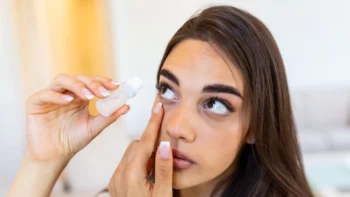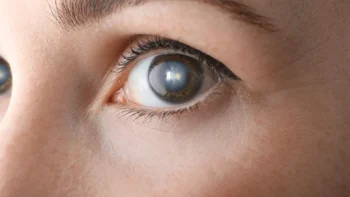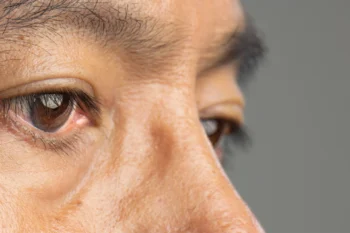Your eyes are your windows to the world. Though only one-sixth of your eye is exposed to your surroundings, it’s made up of over 2 million complex working parts. It can focus on more than 50 different items every second and distinguish between approximately 10 million colors.
Here are some other interesting facts about your eyes:
- Your iris has 256 unique markers, whereas your fingerprint only has 40.
- Of all your organs, only your brain is more complex than your eye.
- Eighty percent of your learning happens through the eyes.
- Most people blink about 12 times a minute.
- The eyes are the most rapidly contracting muscle of the body.
- Heterochromia is the presence of two different eye colors.
Your eyes work by gathering information from your environment. This information is then sent to your brain by the optic nerves in your eyes. Your brain interprets images from that information, which it uses to form new memories and comprehension of what it sees. Your eyes are an important tool for understanding and interacting with the world around you.
Can a Vitamin Deficiency Cause Eye Problems?
Eventually, as you age, “a carrot a day” will not keep the doctor away. Eye problems have several sources, including vitamin deficiency. If your current diet is missing essential vitamins and nutrients that you need daily, or if you have a diagnosed deficiency, this could be a cause for concern. It may also lead you to question whether you should start taking vitamins or other supplements.
What Are Eye Health Supplements?
Recent research has suggested that specific nutrients can delay or prevent medical eye issues. Drug store shelves tend to stock myriad over-the-counter supplements for vision, claiming they contain these nutrients. But many of these have not been clinically tested — so what should you believe?
Many people use dietary supplements to prevent or slow certain eye diseases. There is evidence that certain combinations of vitamins E and C, zinc, and beta-carotene can reduce your risk of macular degeneration. There is also some evidence that carotenoids, like lutein and zeaxanthin, may help delay the progression of cataracts. There is no current data to support the use of vitamins for glaucoma.
Which Supplements Might Aid in Eye Health?
People considering eye supplements may already have the vitamins they’re looking for in their medicine cabinets. Specifically, take a look at your multivitamin. You may find that you’re taking several of the following vitamins already. Check the recommended daily allowance for each as well.
The following supplements have been found to improve eye health:
Zinc
Zinc is an antioxidant that protects against cellular damage. Therefore, it may help slow macular degeneration. It is found naturally in the eye.
Lutein & Zeaxanthin
Lutein and zeaxanthin are carotenoids, which are pigments found in your retina. They help to increase your retina’s density. They absorb eye-damaging ultraviolet and high-energy blue light.
Thiamin/Vitamin B1
An essential vitamin, thiamin — or vitamin B1 — can reduce your risk of developing cataracts. It can also reduce inflammation and stress.
Vitamin C
Vitamin C slows the development of some types of cataracts, especially combined with vitamin E.
Omega-3 Fatty Acids
The photoreceptors in your eyes contain large amounts of omega-3 fatty acids. One type, DHA, aids in the development of retinal cells. It also reduces inflammation and facilitates cellular regeneration after light exposure damage. Lower levels of omega-3 fatty acids in the eyes are linked to dry eyes and retinal damage. The average diet in the U.S. usually does not contain enough of these nutrients.
The National Eye Institute has published guidelines for the supplementary treatment of macular degeneration based on the Age-Related Eye Disease Study (AREDS). The guidelines recommend the following combination of supplements:
- 80 mg zinc
- 2 mg copper
- 10 mg lutein
- 2 mg zeaxanthin
- 400 IU vitamin E
- 500 mg of vitamin C
Some of these supplements have been proven successful in the treatment of eye disorders. However, for most of them, much more research is needed. You should always consult with your doctor before you start taking any vitamins or supplements.
What Does the Science Say?
Macular Degeneration — Results from the AREDS state that dietary supplements, including zinc and certain vitamins, slow the progression of age-related macular degeneration. They may also benefit people with late-stage degeneration in one eye. Adding lutein and zeaxanthin or omega-3s had no effect on late-stage macular degeneration risk. But adding beta-carotene to the mix further reduced the risk of late-stage macular degeneration.
Cataracts — In the AREDS, lutein, zeaxanthin, and omega-3s were added to the original AREDS drug combination but were not found to affect the subjects’ overall risk of needing cataract surgery. However, when participants with vitamin deficiencies added these supplements to the original drug combination, they showed a 32% reduction in progression to cataract surgery.
Glaucoma — The current data from the AREDS does not support dietary supplementation of vitamins A, C, or E for glaucoma. It also does not support treating glaucoma with cannabinoids.
What Else Promotes Eye Health?
Generally, sticking to a nutritious diet will ensure that you won’t develop a deficiency in any essential vitamins. This is true for overall health — not just eye health. A diet rich in leafy vegetables like mustard greens, spinach, and kale supplies the vitamins and minerals needed for good eye health. Other tips for improving your overall eye health include the following:
- Protect your eyes from ultraviolet light with sunglasses, and avoid staring directly at bright lights.
- Quit smoking, or don’t start. Smoking affects the eyes by damaging blood vessels. This can lead to sight problems, cataracts, and macular degeneration.
- Lead an active lifestyle.
- Once you reach the age of 60, visit your doctor for an annual dilated eye exam.
The eye professionals at Brimhall Eye Center will assist you in finding the best treatment options for your eyes. There are many procedures available — both surgical and non-surgical. The physicians and surgeons will work with you to make sure all your vision needs are met. It’s important to consult with a doctor before beginning over-the-counter supplements or attempting to self-manage your eye health. Let Brimhall Eye Center help.





